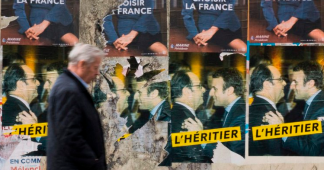Paris, by Dimitris Konstantakopoulos
The cameras are set low. They show him slightly taller than he really is as, alone, to the accompaniment of the “Ode to Joy” he traverses the scene in front of the Louvre, completing the last steps that have led him, to quote Regis Debray, “from Capital to the Capitol”, a pun to remind us of M. Macron’s origins, the first President in the history of France to come out of a bank, and not the least important bank.
His appearance and gait are immaculate. He speaks impeccable French. The only criticism one might make of him would be for arrogance. But is this really a fault, I wonder, or the metteur en scène has chosen to issue a wise reminder to the populace of the class that is destined, since time immemorial and forever, to govern France and the world?
It is an image of perfection. But I can detect in it not a human, spontaneous element, an expression of character, or sentiment. Just in the panegyric finale, a slight laugh. It is the moment when the President realizes, as do we, that he is not able, along with everyone else, to sing the Marseillaise. Clearly he does not know the words to the song of the French Revolution, which became the national anthem of his country, summoning “its citizens to arms”.
In front of the Louvre Pyramid, the crowd is not as large as the televisions are struggling to imply, albeit without insisting. It is probably the smallest to have gathered in comparable situations. And if there are many French people who are relieved at the election of Macron (as there are many who are angry and disappointed), there is also not much enthusiasm. Except among television people, who presumably see it as part of their professional duties to be ostentatious in their displays of joy at the election of the new President.
The degree zero of politics
Here he is now, addressing the crowd and behind them the Nation that fate has now sent him to govern. His speech is about everything and nothing. Full of gracious sentiments and noble intent. It could have been delivered two hundred years ago, or perhaps two hundred years in the future. It promises that problems are going to be addressed. It promises prosperity, reconciliation and much else that is worthy and heartening. But it says not a word on any political subject. It promises nothing specific except goodness, agreeability and happiness.
Only on one subject is something concrete said. The decision to fight the “extremisms”. The choice of the plural, the subsumption of extreme right and left in the “opponent” category, clarifies the aspirations he identifies with and the “historic mission” he has assumed. To put an end to “French exceptionalism”, to impose in France too the global rules and the ideology of neoliberalism, the continually evolving and progressively more radicalized economic dogma of the Kingdom of Money. He has in any case already announced that he intends to “reform” French labour legislation, even without parliamentary approval, but using the almost monarchical powers of the Constitution of the Fifth Republic. His intention to exempt the rich and super-rich from taxation, while hounding everyone else, elicited criticism even from an otherwise neo-liberal commentator at the businessmen’s journal “Les Echos”. Occupying the Presidency was just the first step.
An easy, but very fragile, victory
But the job Mr. Macron came to deliver will be hard to accomplish. For the “extremists” Mr.Macron wants to fight against have already won 55% of the votes in the first round of the presidential election. Both abstention and the number of blank and spoiled ballots reached record levels in the second round.
Only the mechanics of the French presidential system and the repulsion from Lepen have enabled Mr. Macron to become President. Not the accession of even a significant relative majority of the French to the ideas he wants to implement.
This is indicated in any case today by the French press, which underlines the dimensions, but also the fragility, of Macron’s victory.
“Well played” is the title of today’s “Liberation” referring to Macron’s success, and the financial newspaper “Les Echos”, reflecting the interests of employers, bears the title: “France dared”. The traditional newspaper of France’s right wing “Le Figaro”, more cautious, brings the new President down to earth, warning him:
“Let’s face it: the France of Macron, this positive, dynamic, reform-minded France, open to Europe as to the winds from the open sea, is a reality – and that is good. But it represents only about a quarter of the French population. Two other quarters (the supporters of Le Pen, Mélenchon, but also Hamon, we might add) are radically opposed to the values it embodies.”
An invitation to struggle, from the opposition
Jean-Luc Mélenchon did not devote more than two sentences to formal congratulations and greetings to the newly elected President before summoning his supporters into the run-up to the parliamentary elections next month.
The Communist “L’ Humanité”, for its part, welcomed the new President with an invitation to battle against him and his ideas, underlining that he had been elected but without people endorsing his ideas. In its editorial it emphasizes that Macron “wants to strike quickly because he is weak” and underlines the importance of next month’s parliamentary elections for impeding the course he wants to follow.
There can be no doubt that a large segment of the people of France are now lying in wait for the new President, with a rendezvous at the parliamentary elections and after that on the street. Their feelings are well articulated by a personage of the arts (and supporter of Mélenchon) the film director François Ruffin, who created a sensation with his “Open Letter to a Future President who is already Hated”, published a few days ago in “Le Monde” and warning:
“On the morning of the 1st May I was in the marketplace in the Saint Maurice district of Amiens, in the evening in the marketplace of Longeau… I talked to hundreds of people. You could literally feel it in the air: they hate you. I was really shocked. I did not expect it. I was amazed: they hate you. It was the same the previous day at the Moto Cross in Flixecourt. They were saying it to each other in their conversations: they hate you… They hate you – the people without rights, the people who have been forgotten, the people who are unprotected – the people you mention in your speeches, imitating a little bit Jean-Luc Mélenchon…They hate you because they see in you, and rightly so, the arrogant elite. They hate you, they hate you, they hate you. I hammer it at you because along with your court, your entourage, the bourgeoisie you have around you, you have gone socially deaf. You don’t hear the snarling. The incident at the Whirlpool parking lot was just a foretaste. You are on the edge of a precipice, a class abyss”
It is past midnight when I go back to my hotel ruminating on what the next six months are going to be like in France. Groups of very young people are outside, drinking beer and discussing on the steps of the Place de la Republique, under its statue. I overhear a young boy say to his companions: “Only with Revolution can you do things!”
This country will never change!
Translated from Greek by Wayne Hall
Also look: France – the specter of Weimar











